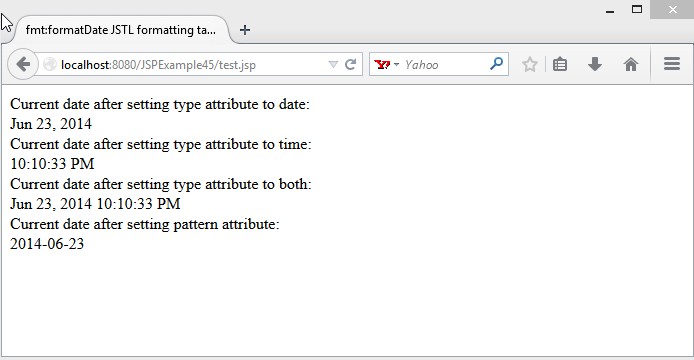The JSTL <fmt:formatDate> Formatting Tag is used for formatting the dates.
Syntax:
<fmt:formatDate value=”val” otherattributes>
fmt:formatDate tag attributes:
| Attribute | Description | Required |
| value | It specify the date value to display. | Yes |
| type | DATE, TIME, or BOTH | No |
| dateStyle | FULL, LONG, MEDIUM, SHORT, DEFAULT. | No |
| timeStyle | FULL, LONG, MEDIUM, SHORT, DEFAULT. | No |
| pattern | It specify the custom formatting pattern. | No |
| timeZone | It specify the time zone of the displayed date. | No |
| var | It specify the name of the variable to store the formatted date. | No |
| scope | It specify the scope of the variable to store the formatted date. | No |
Example:
test.jsp
<%@ taglib uri="http://java.sun.com/jsp/jstl/core" prefix="c" %> <%@ taglib prefix="fmt" uri="http://java.sun.com/jsp/jstl/fmt" %> <html> <head> <title>fmt:formatDate JSTL formatting tag example</title> </head> <body> <c:set var="currentDate" value="<%=new java.util.Date()%>"/> Current date after setting type attribute to date: <br/> <fmt:formatDate type="date" value="${currentDate}" /> <br/> Current date after setting type attribute to time: <br/> <fmt:formatDate type="time" value="${currentDate}" /><br/> Current date after setting type attribute to both: <br/> <fmt:formatDate type="both" value="${currentDate}" /> <br/> Current date after setting pattern attribute: <br/> <fmt:formatDate pattern="yyyy-MM-dd" value="${currentDate}"/> </body> </html> |
web.xml
<web-app> <welcome-file-list> <welcome-file>test.jsp</welcome-file> </welcome-file-list> </web-app> |
Output:

Download this example.
Next Topic: JSTL fmt:parseDate Formatting Tag with example.
Previous Topic: JSTL fmt:parseNumber Formatting Tag with example.